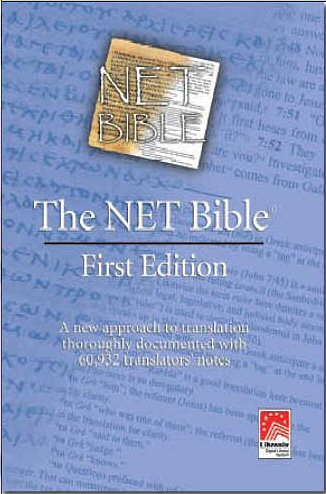
A friend and I were recently talking about Bible translations. Both of us mentioned our appreciation of the NET Bible. It’s not as well-known as other modern translations, but it is for sure a worthwhile translation. Here’s a post I wrote about the NET Bible in February 2018:
As I’ve mentioned here before, while I use the ESV it’s not necessarily my favorite translation. Sometimes the language in the ESV is dated (e.g. “small in stature,” “impudence,” “merry-hearted,” “dissension,” etc.). Other times the grammar/syntax is quite coarse. The other day I was reading 1 Cor. 12:12-26 in the ESV with a friend. After we finished reading, we both paused and noted how rough the translation was and therefore more difficult to understand. And why does the ESV sometimes put the subject after the verb as in 1 John 4:17a: “By this is love perfected with us...”? Anyway, back to the point: the ESV is a good translation, and I use it, but it’s not my favorite. I also use other translations in my studies such as the NASB, the NIV, the CSB, the NLT, and the NET Bible.
Speaking of the NET Bible, I appreciate the translation notes this Bible includes. I don’t always agree with them, but they are helpful in studying the text and translation in more depth. For one example, thinking again of 1 John 4:17a (by this love is perfected…), here is the NET Bible’s translation note:
The referent of ἐν τούτῳ (en toutō – [by this]) here is more difficult to determine than most, because while there are both ἵνα (hina) and ὅτι (hoti) clauses following, it is not clear whether or not they are related to the ἐν τούτῳ. There are actually three possibilities for the referent of ἐν τούτῳ in 4:17: (1) it may refer to the ἵνα clause which immediately follows, so that the love of believers is brought to perfection in that they have confidence in the day of judgment. The main problem with this interpretation is that since the day of judgment is still future, it necessitates understanding the second use of the preposition “in” (second ἐν [en]) to mean “about” or “concerning” with reference to the day of judgment in order to make logical sense. (2) The ἐν τούτῳ may refer to the ὅτι clause in 4:17b, meaning “love is perfected with us … in that just as he [Christ] is, so also are we in this world.” This makes logical sense, and there are numerous cases where ἐν τούτῳ is explained by a ὅτι clause that follows. However, according to this understanding the intervening ἵνα clause is awkward, and there is no other instance of the phrase ἐν τούτῳ explained by a following ὅτι clause where a ἵνα clause intervenes between the two in this way. (3) Thus, the third possibility is that ἐν τούτῳ refers to what precedes in 4:16b, and this also would make logical sense: “By this—by our residing in love so that we reside in God and he resides in us—is love brought to perfection with us.” This has the additional advantage of agreeing precisely with what the author has already said in 4:12: “If we love one another, God remains in us and his love is brought to perfection in us.” Thus option (3) is best, with the phrase ἐν τούτῳ referring to what precedes in 4:16b, and the ἵνα clause which follows indicates the result of this perfection of love in believers: In the future day of judgment they will have confidence. The ὅτι clause would then give the reason for such confidence in the day of judgment: because just as Jesus is, so also are believers in this world—they are already currently in relationship with God just as Jesus is.
If you haven’t used the NET Bible, it is worth checking out. As with all translations there are strengths and weaknesses. One thing we can be very thankful for is the fact that in English we have access to quite a few good translations. In a good way, we should be taking advantage of that as we study God’s Word to grow in it!
Shane Lems
Hammond, WI, 54015

